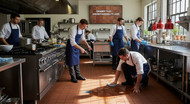What is Quarry Tile? Understanding Its Uses and Benefits
Posted by Mike Belk on Sep 04, 2025

Quarry tile might seem like just another flooring option, but its reputation for sheer toughness is backed by the numbers. These tiles are fired at temperatures exceeding 2000 degrees Fahrenheit and have extremely low water absorption rates. Most people expect all ceramic tiles to be more or less the same, but quarry tile is in a different league when it comes to lasting under pressure. Its unique manufacturing process and raw material selection set a new standard for what resilient flooring really means.
Table of Contents
- Defining Quarry Tile: Materials And Characteristics
- Importance Of Quarry Tile In Construction And Architectural Applications
- How Quarry Tile Is Made And What Sets It Apart
- Common Applications Of Quarry Tile In Homes And Businesses
- Evaluating The Durability And Maintenance Of Quarry Tile
Quick Summary
| Takeaway | Explanation |
|---|---|
| Quarry tiles are extremely durable | Their robust composition makes them ideal for heavy traffic areas in both residential and commercial settings. |
| Manufactured through high temperature firing | This process creates a dense, non-porous surface resistant to moisture and wear. |
| Ideal for high moisture environments | The natural slip resistance and durability make quarry tiles perfect for areas like kitchens and bathrooms. |
| Minimal maintenance required | Quarry tiles resist dirt accumulation and require only regular sweeping and mopping for upkeep. |
| Versatile design options available | Their aesthetic appeal and textured finish allow integration into various architectural styles seamlessly. |
Defining Quarry Tile: Materials and Characteristics
Quarry tile represents a specialized ceramic tile designed for durability and performance in demanding environments. Unlike traditional ceramic tiles, quarry tiles are manufactured through a unique process that produces an exceptionally robust flooring solution. Learn more about ceramic tile composition to understand the foundational similarities.
Raw Material Composition
Quarry tiles originate from dense, natural clay minerals extracted from specific geological deposits. These raw materials typically include:
- Shale
- Natural clay
- Mineral aggregates
- Silica components
The mineral composition gives quarry tiles their distinctive characteristics. Manufacturers subject these materials to extreme temperatures during production, often exceeding 2000 degrees Fahrenheit, which creates an incredibly dense and non porous surface.
Manufacturing Process and Physical Properties
The manufacturing of quarry tiles involves an extrusion method that differs from traditional tile production. Clay mixtures are pressed through specialized dies, creating tiles with uniform thickness and exceptional structural integrity. According to the U.S. National Park Service, this process results in tiles with remarkable physical properties:
- Extremely low water absorption rates
- High compressive strength
- Superior slip resistance
- Remarkable durability under heavy traffic conditions
These characteristics make quarry tiles an outstanding choice for commercial and industrial environments that demand resilient flooring solutions.
The following table summarizes the main physical properties that define quarry tile, making it uniquely suited for demanding environments and differentiating it from many other tile types.
| Physical Property | Description |
|---|---|
| Water Absorption | Extremely low, making the tile non-porous and moisture resistant |
| Compressive Strength | High; able to withstand heavy loads and foot traffic |
| Slip Resistance | Excellent due to natural, unglazed, and textured surface |
| Durability | Remarkable even under mechanical stress and chemical exposure |
| Maintenance | Minimal, thanks to the dense, dirt-resistant composition |
| Firing Temperature | Exceeds 2000 degrees Fahrenheit |
| Structural Integrity | Maintains shape and performance in high-stress environments |
Importance of Quarry Tile in Construction and Architectural Applications
Quarry tile stands as a critical material in modern construction and design, offering architects and builders a robust solution for challenging environments. Its unique properties make it an indispensable choice for spaces requiring exceptional durability and performance. Explore different floor tile options to understand its comparative advantages.
Strategic Applications in High Traffic Zones
The exceptional resilience of quarry tile positions it as a premier selection for environments subjected to intense use and potential wear. Commercial spaces like restaurant kitchens, industrial facilities, hospital corridors, and public transportation hubs rely on quarry tile for its extraordinary performance characteristics. These tiles can withstand constant foot traffic, heavy equipment movement, and potential chemical exposures without compromising structural integrity.
Key strategic applications include:
- Industrial manufacturing floors
- Commercial kitchen environments
- Hospital and healthcare facility walkways
- Institutional building entrances
- Retail store high traffic areas
Architectural and Aesthetic Considerations
Beyond its functional superiority, quarry tile offers architects and designers a versatile design element. The unglazed, natural finish provides a distinctive aesthetic that bridges utilitarian functionality with visual sophistication. Its inherent textured surface introduces depth and character to spaces, allowing designers to create environments that are simultaneously practical and visually compelling.
The material’s ability to maintain its appearance under rigorous conditions makes it an intelligent choice for spaces requiring both aesthetic appeal and long term performance. Architects appreciate quarry tile’s capacity to blend seamlessly with various design languages, from industrial minimalism to rustic traditional styles, providing a flexible design solution that does not sacrifice durability for visual elegance.
How Quarry Tile is Made and What Sets It Apart
Quarry tile production represents a sophisticated manufacturing process that distinguishes it from standard ceramic tiles. Discover more about ceramic tile composition to understand the nuanced differences in tile manufacturing techniques.
Raw Material Selection and Preparation
The journey of quarry tile begins with meticulous raw material selection. Manufacturers carefully source specific clay compositions that provide exceptional durability and performance. These raw materials undergo rigorous screening to ensure:
- Consistent mineral content
- Minimal impurities
- Optimal structural integrity
- Precise chemical composition
Unlike standard ceramic tiles, quarry tile ingredients are selected for their ability to withstand extreme environmental conditions. The clay mixture typically includes a combination of natural shale, silica, and mineral aggregates that contribute to the tile’s remarkable strength and resilience.
Extrusion and High Temperature Firing Process
Quarry tile manufacturing involves a distinctive extrusion process that sets it apart from other tile production methods. Clay mixtures are pressed through specialized dies under high pressure, creating tiles with uniform density and exceptional structural characteristics. The production involves:
- Precise clay mixture preparation
- High pressure extrusion through specialized dies
- Extreme temperature firing exceeding 2000 degrees Fahrenheit
- Carefully controlled cooling processes
According to the U.S. National Park Service, this unique manufacturing approach results in a tile with significantly lower water absorption rates and superior structural integrity compared to traditional ceramic tiles. The high temperature firing transforms the raw materials into an incredibly dense, non porous surface capable of withstanding significant mechanical stress and environmental challenges.

Common Applications of Quarry Tile in Homes and Businesses
Quarry tile’s exceptional durability and versatility make it an outstanding flooring solution across residential and commercial environments. Explore elegant tile design options to understand how different tile types complement various architectural styles.
Residential Applications
In home settings, quarry tile provides homeowners with a robust and aesthetically pleasing flooring option. Its natural slip resistance and durability make it particularly suitable for high moisture and high traffic areas. Key residential applications include:
- Entryway and mudroom flooring
- Kitchen floors and backsplashes
- Patio and outdoor walkway surfaces
- Laundry room and utility space flooring
- Garage and workshop areas
Homeowners appreciate quarry tile’s ability to withstand constant foot traffic, resist moisture, and maintain its appearance with minimal maintenance. The tile’s textured surface also adds a subtle visual interest while providing excellent traction in potentially slippery areas.
Commercial and Industrial Environments
Commercial spaces represent the most extensive application domain for quarry tile. Its exceptional resilience makes it an ideal choice for environments subjected to intense use and potential wear. According to the U.S. National Park Service, quarry tile is particularly effective in spaces requiring robust flooring solutions.
Specific commercial applications include:
- Restaurant and commercial kitchen floors
- Hospital and healthcare facility corridors
- Retail store and shopping center walkways
- Industrial manufacturing facility floors
- Public transportation station areas
In these environments, quarry tile’s capacity to resist chemical exposure, withstand heavy equipment movement, and maintain structural integrity under continuous stress makes it an invaluable flooring solution. Its unglazed, textured surface also provides superior slip resistance, enhancing safety in potentially hazardous work environments.
Evaluating the Durability and Maintenance of Quarry Tile
Quarry tile represents an exceptional flooring solution renowned for its remarkable durability and minimal maintenance requirements. Discover essential tile maintenance techniques to understand comprehensive care strategies for different tile types.
Long Term Performance and Structural Resilience
The extraordinary durability of quarry tile stems from its unique manufacturing process and dense ceramic composition. Unlike standard flooring materials, quarry tile demonstrates exceptional resistance to:
- Mechanical stress and impact
- Chemical exposure
- Temperature fluctuations
- Moisture penetration
- Continuous foot traffic
Its robust structure allows quarry tile to maintain structural integrity even in demanding environments. The material’s inherent strength means it can withstand significant wear without compromising its aesthetic or functional qualities, making it a cost effective long term flooring investment for both residential and commercial applications.
Maintenance and Preservation Strategies
Maintaining quarry tile requires minimal effort compared to other flooring materials. The unglazed surface naturally resists dirt accumulation and does not require extensive cleaning protocols. Regular maintenance typically involves:
- Simple sweeping or vacuuming
- Occasional mopping with neutral pH cleaning solutions
- Prompt cleaning of spills to prevent potential staining
- Periodic sealing to enhance surface protection
According to the U.S. National Park Service, quarry tile’s dense composition means it does not easily chip, crack, or deteriorate under normal usage conditions. Its low maintenance requirements and exceptional durability make it an ideal flooring solution for spaces demanding consistent performance and minimal upkeep.

Upgrade Your Space with Lasting Quarry Tile Solutions
If you are struggling to find flooring that stands up to heavy wear, resists moisture, or requires minimal maintenance, you are not alone. Many commercial and residential spaces face the problem of worn or unsafe flooring, especially in high traffic or wet environments. The article above explains how quarry tile’s dense composition and exceptional durability offer a reliable answer to these challenges. At BELK Tile, we understand what a difference the right materials can make for your property’s value and peace of mind. Our curated selection includes robust ceramic and specialty tiles designed for real-life performance and style in kitchens, entryways, patios, and more.
Ready to experience the difference for yourself? Browse our inspiring collections for floor tile options and see how our products stack up to your needs. If you are looking for maintenance guidance to keep your tiles pristine year round, explore our tips for tile maintenance made easy. When you are ready to transform your space with proven quarry tile solutions, visit BELK Tile’s main site and take the first step now. Your project deserves a flooring upgrade that lasts.
Frequently Asked Questions
What is quarry tile made of?
Quarry tile is composed of dense natural clay minerals, such as shale, natural clay, mineral aggregates, and silica components, which are subjected to high temperatures during production to create a robust, non-porous surface.
What are the main benefits of using quarry tile in commercial spaces?
Quarry tile offers exceptional durability, low water absorption, high compressive strength, and superior slip resistance, making it ideal for high-traffic environments like commercial kitchens, hospitals, and industrial facilities.
How does quarry tile compare to standard ceramic tiles?
Unlike standard ceramic tiles, quarry tile is made through a unique extrusion method and fired at higher temperatures, resulting in a denser structure with lower water absorption rates and greater resistance to wear and chemical exposure.
To help clarify the differences between quarry tile and standard ceramic tile, the table below compares key manufacturing and performance characteristics mentioned in the article.
| Attribute | Quarry Tile | Standard Ceramic Tile |
|---|---|---|
| Raw Materials | Dense natural clays, shale, minerals | Refined clay, may include other additives |
| Manufacturing Process | Extrusion, high pressure, high temp (2000°F+) | Pressed or extruded, lower temp firing |
| Water Absorption | Extremely low | Higher than quarry tile |
| Surface | Unglazed, textured, non-porous | Often glazed, can be smooth or textured |
| Durability | High compressive strength, superior under heavy traffic | Lower compressive strength, less suitable for intense wear |
| Slip Resistance | Superior (natural texture/unglazed) | Varies; glazed tiles may be slippery |
| Typical Use | Commercial kitchens, heavy-traffic, industrial, wet areas | Residential, decorative, lighter-use areas |
What are common applications of quarry tile in residential settings?
In homes, quarry tile is commonly used in entryways, kitchens, patios, laundry rooms, and garages due to its durability, slip resistance, and maintenance ease, making it suitable for high moisture and high-traffic areas.



